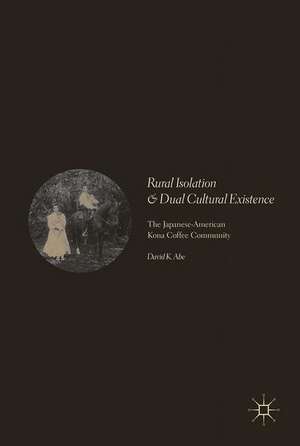Rural Isolation and Dual Cultural Existence: The Japanese-American Kona Coffee Community
Autor David K. Abeen Limba Engleză Hardback – 7 aug 2017
| Toate formatele și edițiile | Preț | Express |
|---|---|---|
| Paperback (1) | 532.31 lei 38-44 zile | |
| Springer International Publishing – 12 aug 2018 | 532.31 lei 38-44 zile | |
| Hardback (1) | 862.28 lei 6-8 săpt. | |
| Springer International Publishing – 7 aug 2017 | 862.28 lei 6-8 săpt. |
Preț: 862.28 lei
Preț vechi: 1014.45 lei
-15% Nou
Puncte Express: 1293
Preț estimativ în valută:
164.100€ • 179.79$ • 139.03£
164.100€ • 179.79$ • 139.03£
Carte tipărită la comandă
Livrare economică 23 aprilie-07 mai
Preluare comenzi: 021 569.72.76
Specificații
ISBN-13: 9783319553023
ISBN-10: 331955302X
Pagini: 280
Ilustrații: XI, 295 p. 24 illus., 12 illus. in color.
Dimensiuni: 148 x 210 mm
Greutate: 5.0099999999999998 kg
Ediția:1st ed. 2017
Editura: Springer International Publishing
Colecția Palgrave Macmillan
Locul publicării:Cham, Switzerland
ISBN-10: 331955302X
Pagini: 280
Ilustrații: XI, 295 p. 24 illus., 12 illus. in color.
Dimensiuni: 148 x 210 mm
Greutate: 5.0099999999999998 kg
Ediția:1st ed. 2017
Editura: Springer International Publishing
Colecția Palgrave Macmillan
Locul publicării:Cham, Switzerland
Cuprins
1. The Issei: In Search for Autonomy.- 2. Religious and Social Communities: The Importance of Ethnic Solidary.- 3. The Nisei Experience.- 4. World War II.- 5. Rebuilding Social and Religious Communities: The Aftermath of the War.
Notă biografică
David K. Abe is Associate Professor at Kanazawa University in Japan.
Textul de pe ultima copertă
This book studies the Japanese-American coffee farmers in Kona, Hawaii. Specifically, it sheds light on the role of first and second generation immigrants in the emergence of the Kona coffee agricultural economy, as well as factors that contributed to the creation of the Japanese community in Kona. The people there have survived much turmoil, including harsh treatment on the sugar plantations, economic instability, Pearl Harbor and racial stigma, and ethnic and religious identity crises. Despite these challenges, the pillars of the Japanese coffee community have remained stable.
Caracteristici
Examines a unique and understudied population in the United States Discusses the assimilation of immigrant communities through the experiences of first and second generation migrants Sheds light on the treatment of Japanese-Americans before and after World War II














